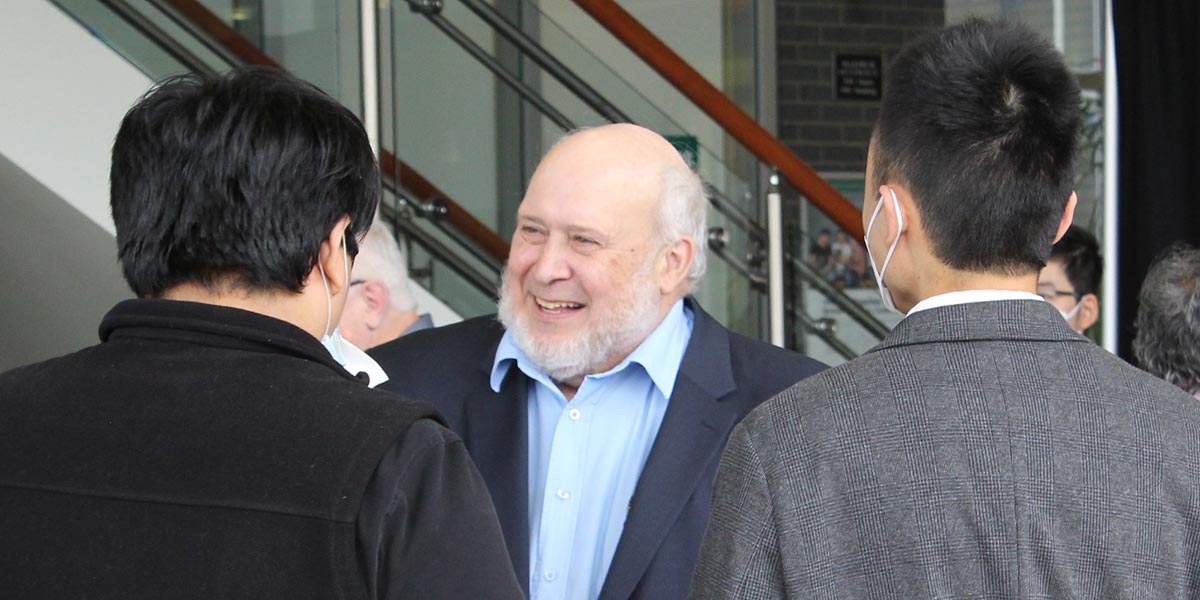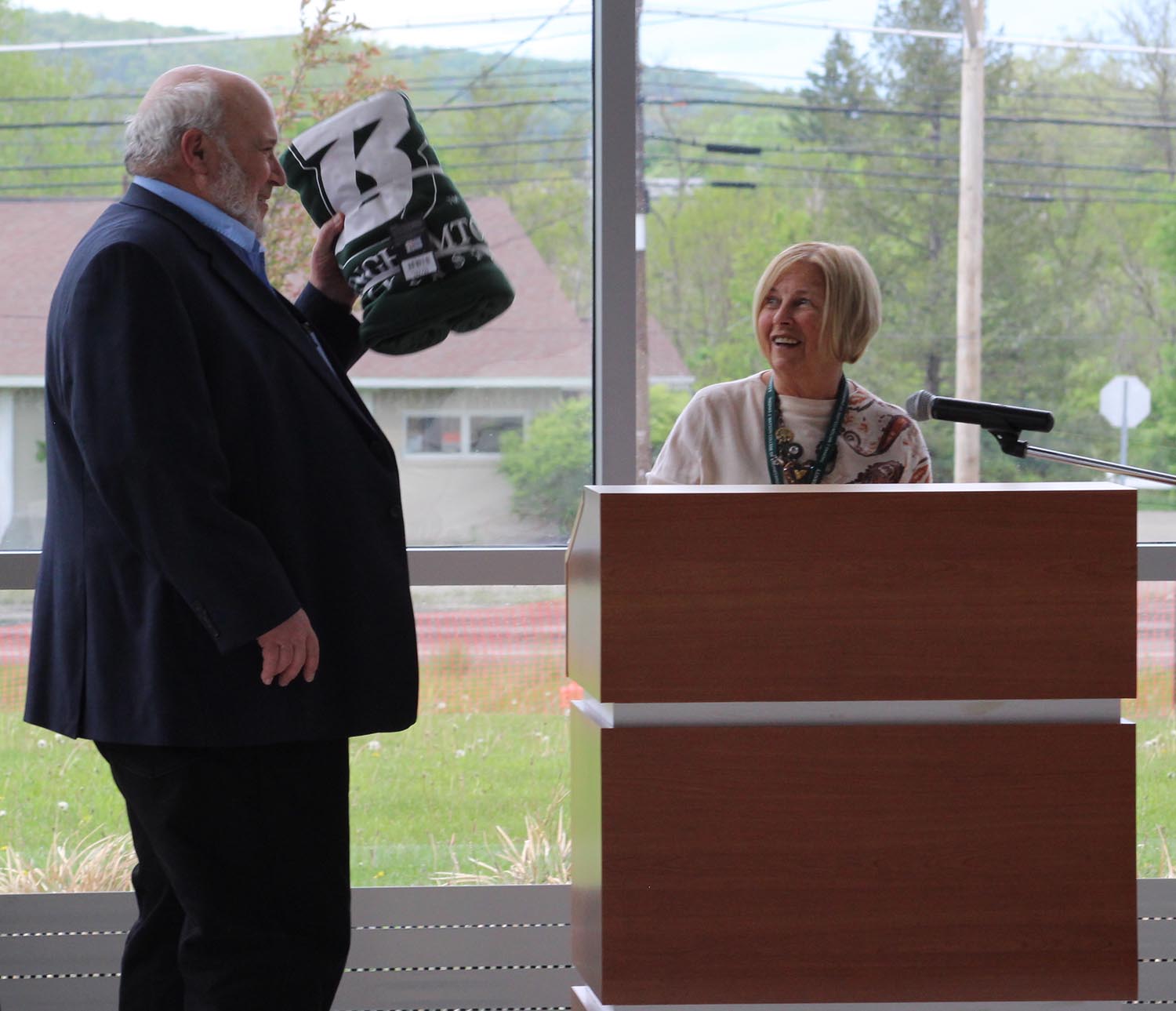SSIE associate professor retires after 24 years on Watson College faculty
Harold Lewis ‘77, MS ‘86, PhD ‘95, spent time in industry and academia in Japan and the U.S.

When you learn that Associate Professor Harold Lewis ‘77, MS ‘86, PhD ‘95, was born just outside the Binghamton city line, earned his three degrees at Binghamton University and spent more than a quarter-century on the faculty, you might think: Here’s a guy who stuck close to home for most of his life.
Talk to him for a few minutes, though, and he’s likely to tell you about his deep love for Japanese culture — an affection he’s harbored since he was a teen that blossomed during two years-long stints in the Land of the Rising Sun.
Every professor at Binghamton has a story about joining higher education, but Lewis’ journey from Japanese industry to American industry and then from Japanese academia to American academia is a unique one.
At the end of the spring semester, he retired after 24 years as part of the faculty at the Thomas J. Watson College of Engineering and Applied Science’s Department of Systems Science and Industrial Engineering. During that time, he’s been an adamant and avuncular advocate for systems science, a research area that can include mathematicians like himself as well as engineers, computer scientists, psychologists, linguists, biologists and dozens of other disciplines.
“Identity is important, and one of the challenges with systems science is the identity issue,” Lewis said in an interview. “People assume that it’s a branch of engineering — but when we look at it from the broader perspective of its history, I think it’s a mistake to think of it that way. It has many connections to engineering, but it’s actually a very broad thing that has connections to most other fields.”
Although he grew up near the city, his maternal grandparents ran an old-fashioned farm in the country — no electricity, lots of manual labor — “almost like 19th century life.” His experiences there gave him an appreciation for rural life that he still holds today.
“I looked at different options when it was time to go to college, and it made so much sense just staying locally — it seemed like the most practical thing to do,” he said. “Sometimes I commuted by bicycle, but often by bus. My original intention was to study physics, but shortly after starting, I thought maybe I had more of an affinity for being a math major.”
Like many young people, Lewis wanted to spend some time overseas, and his original inclination was toward Europe, but through friends of his family, he got the chance to spend a summer working in Japan.
“I thought I was going to be interning in an engineering department in a company over there, but Japanese companies don’t really do an internship type of thing,” he said. “So, strangely enough, I ended up working in the shipping department over the summer. In a way, that was an advantage because no one there was going to make an extra effort to practice their English on me. I became fluent in a very broken Japanese sort of way.”
Lewis fell in love with Japan by the end of the summer, and he returned to Binghamton determined to graduate early. In 1977, a few months short of his 21st birthday, he took a permanent job at the same Japanese firm.
“Being the only non-Japanese person in a company of about 550 people, when any foreign visitor came, I was the translator for the day,” he said. “If there was any kind of international speaker coming to town, I went down to see them and came back with an executive summary.”
Although the company’s main product was lighting, Lewis worked in a department tasked with diversifying the business in other areas, such as solar energy and industrial pollution control equipment.
“It was just a small group of people doing all these different things, so it was a fascinating kind of job where everyone worked as a team to fill niches in the market, and everyone was happy,” he said. “That job gave me some interesting challenges and helped me to develop in a certain way.”
Family reasons and a job at IBM Corp. brought him back to the Binghamton region after more than four years. He also wanted to pursue a master’s degree and originally considered economics, but then found out more about systems science and felt attracted there instead.
“I tell students in similar situations now that I can relate to them when they feel this kind of three-way tension with a full-time professional job, a family and trying to study all at the same time,” he said. “A particularly enjoyable part of it was taking courses and doing my thesis here, which took up a good share of the 1980s.”
In the late ’80s, a visiting scholar from Fukushima University suggested that Lewis explore a faculty position there. Until then, Japan had required that all tenure-track professors in the national university system be Japanese, but those rules were loosening. He applied for the job and got it, moving halfway across the world yet again.
While back in Japan, he also continued to work on his PhD under Distinguished Professor George Klir. They shared a common interest in fuzzy logic, which allows for shades of uncertainty within a given set of variables. Many control systems use fuzzy logic, as does artificial intelligence software.
“When I started teaching at Fukushima University, Japanese industry was going through what could be called a ‘fuzzy boom,’” he said. “If you went into a department store in Japan, you’d get off the escalator on the home appliances floor, and all the better models would have a big label on them that just said ‘fuzzy’ in Japanese script. Everybody was buying ‘fuzzy’ control refrigerators or ‘fuzzy’ control rice cookers or ‘fuzzy’ control kerosene heaters — that was how popular the concept became. A lot of the research centers across the country were very much focused on fuzzy control.”
After teaching and doing research in Japan while finishing his PhD dissertation, Lewis had the opportunity to return to Binghamton and join the systems science faculty in 1998. In addition to being the program’s graduate director, he became a peer to professors who had been his mentors, joining Klir and others to further explore fuzzy logic and related topics.
“During the time I was at Fukushima, I began to see why this broader field that we sometimes called soft computing or computational intelligence — a hybrid of fuzzy logic in neural networks and evolutionary computing — was more powerful than looking at those methodologies individually,” he said.
One project tried to figure out the optimum way for doctors to perform surgeries remotely using robotics, to help patients who are critically injured far from medical care such as the South Pole or the middle of a jungle. Lewis’ team borrowed an endoscopic device used to train medical interns that had a camera and a display screen.
“I remember bringing it down in my pickup truck and setting it up in the basement of the Engineering Building,” he said. “We had one of the technicians install a time-delay device, so that by turning a dial you could adjust how much time delay there was between when you did something and when it showed up on the video screen.”
The experiments did not go as expected, however: “When the subjects got up to around two-thirds of a second, they stopped the experiment there. We asked them why, and they said they were all getting motion sickness from it. There’s something about approximately two-thirds of a second delay that causes people to have this kind of reaction.”
In his last few years at Binghamton, Lewis focused less on research and more on students, winning a Chancellor’s Award for Excellence in Teaching in 2013. Even now, he’s going to consider himself “90% retired,” still advising a few Watson students along their academic journey.
He also plans to pursue his interests in genealogy, bond with his young grandson and spend more time on his farm, just over the border in Pennsylvania.
“It’s been a fun career,” he says. “From Japanese industry and American industry to Japanese academia and American academia — it’s not a combination that a lot of people have. I’ve benefitted greatly from having that perspective from both worlds.”

